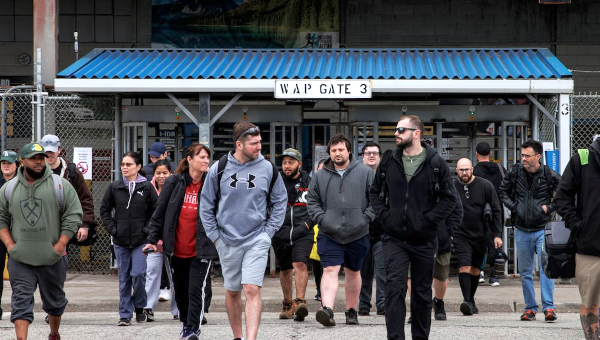Treading Water: Four Years of Ontario’s Liberals
The champagne corks were popping the night of October 2, 2003, the night four years ago when Dalton McGuinty and his Liberal party sent the Common Sense Revolution to the dustbin. Eight years of the most repugnant government in Ontario’s postwar history had concluded. It was indeed a cause for celebration. McGuinty’s Liberals had run on a platform which bravely stated that, if elected, taxes would not be cut again. Maintaining important public services was simply too important. The Liberals were unequivocal on this. They were equally unequivocal in saying taxes would not go up. This gave them a political edge, but it also blocked the need for public debate on that issue. But after eight years of watching the hollowing out of the Ontario public sector, it was refreshing to hear a commitment to reinvesting in public services and words of respect for the people who deliver those services.
Neoliberalism with a Human Face
That was then. There is now a four year record to examine. The enduring theme of the Ontario Liberals over this period has been that they have chosen to reinvest in health, education and social services. The record shows that they have reinvested in social programs, spending 19% more on these services in 2007 than in 2004. Although when inflation is factored in, the real growth in expenditure is a rather less interesting 10-11%. And when one looks at inflation in specific sectors, such as health for example, the sectoral inflation rate is about 9%. It certainly beats the roll-backs and gouging that took place under the Harris-Eves Conservatives. But it is, at the same time, indicative of the tepid commitments of the Liberal government and their unwillingness to reverse the policies and cuts of the Harris years. A stark illustration of this is the Liberal government’s recalcitrant and meager increase in social assistance rates. These were cut by 21% in 1995 and have never been restored to their pre-Common Sense Revolution levels.
It is worth noting that the Liberal failure to reverse the Harris cuts has occurred during a period of very decent economic growth and a concomitant expansion of government finances. Now that the economic future is rather less sure, as the Ontario manufacturing sector continues to be hammered with job losses and as financial markets appear very unpredictable, one must wonder, what will a 2008 Liberal budget look like? Should they return on October 10th with a majority, the odds are, and history predicts this, that Ontarians will see even this modest improvement cut back or, at best, frozen.
Throughout their four years in government, the McGuinty Liberals have maintained an abiding fidelity to the fiscal conservatism and the privileging of business interests which marked the Common Sense Revolution. This legacy lives on at Queen’s Park, having been politically embedded in policy and structures. The McGuinty government has not meant a rupture with the Common Sense Revolution: it has served to sustain that project. The evidence for this charge is ample. From the beginning the Liberals were committed to a policy of no tax increases. This is a promise they have kept (notwithstanding the reintroduction of an extraordinarily regressive health care surtax that sees teachers and Bay Street bond traders paying the same additional taxes).
Taxation has become a politically vexing issue. Working families have seen their pre-tax income stagnate for the past 20 years. At the same time, the tax regime has become increasingly regressive. Every advantage has been given to those with money to duck and dodge the taxman both legally and illegally. The McGuinty government again demonstrates that it is a party of and for business. Rather than tackle the question of taxation in a meaningful manner, the choice is to maintain the arrangements struck by Mike Harris. The Harris era 30% cut in the tax rate and the elimination of several dozen taxes on various business-related activities left in place a more regressive tax regime and one that is not capable of meeting the needs of Ontario infrastructure, social and economic needs. Fair taxation might have been a theme for a pragmatic government. But not this one.
Liberal P3s: Public Pays and Bay Street Profits
The McGuinty government has also sustained the usage of public-private partnerships. These are arrangements where private interests make safe investments in public infrastructure like hospitals. Citizens ensure profits with their tax dollars. The McGuinty government has invested some $30 billion in such infrastructure projects. They revealed in 2005 that they wanted to use workers’ pension funds for such P3s and leverage this with private investors. This is risk-free capitalism for private investors, but it has proven, in almost every study of the issue, to be more expensive for taxpayers.
P3s were a central and prominent theme of the Liberal government as far back as 2004, when Greg Sorbara, the Minister of Finance, announced a full review of government spending and priorities. As a result, in 2005, 15 ministries saw their budgets shrink and Sorbara signaled a strong preference for privatization and contracting out. He stated: “the province should only be in the business of direct service delivery when it can provide a service more efficiently than anyone else.” Health Minister George Smitherman also mused about the money that could be saved if hospitals contracted out all non-medical staff such as laundry workers, cleaners and kitchen staff. This essentially means cutting jobs for the workers making $18.00/hour, while increasing doctors’ incomes, who then invest their surplus incomes in sidelines such as for-profit nursing homes, and allowing hospital managers to pull down a rather nice $500,000 a year. People earning $18/hour spend their money locally while the wealthy have a propensity to invest elsewhere.
Money for Nothing?
Another theme of the McGuinty period in power has been subsidies for capital in a range of sectors. The largest of these has been the Ontario Auto Investment Strategy, meant to attract or retain auto industry plant in Ontario. The auto companies used job blackmail to leverage these subsidies. American states do the same thing, creating a race to the bottom where the key beneficiary is the stockholder. Whether workers’ jobs are secured is unknown as the written agreements between the auto corporations and the Ontario government are not available for public review. Without greater public controls over investment, sectoral planning and public companies, this process will continue. The McGuinty government has done nothing to alter this aspect of neoliberalism.
Liberals Not in a Hurry
The most recent Liberal budget of March 2007 maintained the ‘talk progressive, act for business’ politics. The commitment to raise the minimum wage to $10.25/hour was sold as a bold move, but it is only to occur over three years and will still not exceed the cuts in real terms of the Harris years. Even this proposal had been resisted and disavowed by the government a mere week before the budget, a fact that speaks to the scare they received in losing what had been a rather solid Liberal seat in a by-election. New Democrat MPP Cheri DiNovo deserves full marks for placing the minimum wage back on the political agenda through her campaign to raise it to $10.00/hour – not in three years but immediately. Combined with the Toronto Labour Council’s
“Million Reasons Why” campaign and the organizing efforts of UNITE-HERE, the message that declining and stagnant wages in the midst of unprecedented wealth was simply not acceptable struck a chord with working families in York South Weston and, indeed, across the province.
On other important fronts, such as energy, the McGuinty Liberals have been unsure as to how to proceed. They have flip-flopped on promises around shutting down coal plants, re-regulating the electricity sector and expanding renewable energy. They have finally settled on what they had opposed in the last campaign – expanding nuclear power generation. The lack of an energy strategy has been costly for Ontario workers, but also for the provincial government’s commitment to making a significant effort toward carbon emissions reduction (the cover they now use for the expansion of nuclear power). Once again, the Ontario McGuinty government has failed to plan and act decisively and, instead, sustains the neoliberal energy and environmental policies of the Harris government.
Beyond the Political Horizon of Neoliberalism?
The 1990s was a decade where the political horizons in Ontario were shrunk dramatically. The New Democrats self-destructed in their efforts to be respectable in the eyes of corporate Canada and, in the process, relegated the party to near obscurity. The Conservatives effectively reframed the terrain of debate and the Liberals cast themselves first as ‘tory-lite’ in the election of 1999. They learned from that fiasco and talked slightly left in their discourse and opposed the hacking down of public services. But they have not altered the neoliberal legacy of the Harris Common Sense Revolution (itself given political breathing space by the disaster of the Rae NDP government and its waffling on progressive issues before settling into public sector restraint). We still live in the policy shadow of that neoliberal mess as the provincial election date of October 10th draws near. The McGuinty government, too, has given the Ontario public neoliberalism, albeit with a human face. The economic context is now different. If indeed Ontario, and perhaps the world, is slipping into yet another economic crisis, the breadth of insecurity may well be horrifying as the destruction of what few tools for social protection we possessed prior to 1995 have never been rebuilt.
For the Left, there are important choices to be made and, as with past elections, important decisions to be made about our role and future prospects. New Democrats deserve a measure of credit for making the minimum wage central to political debate. And they and the Greens were quick to condemn the reactionary Conservative proposal to extend public funding to faith-based schools. The Greens have gone even further and have called for a completely secular public education system. Despite their embrace of ‘market ecology,’ this position of the Greens, and a few others such as a focus on proportional representation, will almost certainly draw attention and register in electoral outcomes. Opinion polls are consistently showing that the outcome on October 10th is uncertain, with the Liberals down in minority government range, the Tories up and the Greens now on the electoral radar.
The New Democrats are consistently showing at 18-20 % in public opinion polls. This is still a long way from their historic pre-Rae government averages of 25%, but there are signs of resurgence. It may well be that a minority government will emerge and the NDP will have an opportunity to place important issues at the forefront of the government agenda. In this respect, the Left can play an important role in giving profile and substance to such issues as the pressing need for an anti-poverty strategy which encompasses the need for a living wage policy in addition to an economy that generates meaningful and quality employment, a sustainable and just settlement of the crises confronting Aboriginal communities, a re-conceptualization of health care before the profiteers turn this into a marketplace – and this is happening much faster than is generally acknowledged. And, of course, there is a need to link all of the above to environment policy.
Simply voting NDP is not going to deliver this agenda. There is an ongoing need to build a stronger anti-neoliberal coalition which would assist electoral mobilization by framing key issues that would otherwise be ignored. Again, the minimum wage is a stellar illustration of this point. It was nowhere on the political radar until extra-parliamentary forces placed it there, led by the long campaign of poverty activists around the Ontario Coalition for Social Justice, and some Ontario unions, especially UNITE-HERE and the Toronto Labour Council. The NDP was very slow to pick this up, reluctant even, until Cheri DiNovo and Paul Ferreira won two by-elections where the issue was a central part of their individual campaigns.
There is, as well, the significant and vital issue of organizing the socialist Left so that it can shape and inform debate but also play a role directly in all manner of engagement including electoral. The Left in Ontario, and indeed Canada, is incredibly disorganized. It is not really possible to speak of an activist union Left in any serious way, as it has neither organization and strategy nor campaigns across unions. The Left beyond that simply does not register as a social force, and is not capable of transforming union politics or winning specific campaigns at the current level of strength and unity. It is barely able to maintain the presence of socialist ideas in Ontario public discourse and education. This educational role is a crucial task for the Left during elections, given the make-up of parliamentary representation. Developing some additional organizational capacity in leading anti-neoliberal fights would also be an advance that the election campaign can help spur. The referendum on Mixed-Member Proportional Representation (MMP) is one crucial area where both education in democracy and some Left organizational capacity could be added. In the longer-term, an MMP system raises the potential of providing more options to workers and unions. For what it is worth, it would also ensure the New Democrats play an ongoing important role in setting the policy agenda of future governments. Anti-poverty, healthcare and indigenous rights campaigns during the election should also provide space for education in socialist ideas, and developing anti-neoliberal forces. These campaigns all deserve the utmost support and work of activists. But we are still some distance from being able to hoist the banner of socialism as an active social force in the realm of ideas, campaigns and political organization in Ontario. Without that Left reformation – and even if a minority government forms after October – neoliberalism and its discontents will continue to dominate the agenda of Ontario politics. •
Other articles on the Ontario election in Relay #19:
- Anti-Poverty or Anti-Capitalism — Jacquie Chic
- Politics, Poverty and the Social Determinants of Health — Dennis Raphael
- What Goes Around, Comes Around in Northern Ontario — John Peters
- McGuinty’s Public Power Promise — Paul Kahnert
- Building Houses and Political Influence — Robert MacDermid
- A Progressive Directory
Ontario’s Referendum on Electoral Reform
- Against All Odds: Winning Electoral Reform in Ontario — Dennis Pilon
- The Ontario Referendum on Electoral Reform: Left Possibilities? — Besmira Alikaj
- Loading the Dice on the Referendum — Elizabeth Rowley





